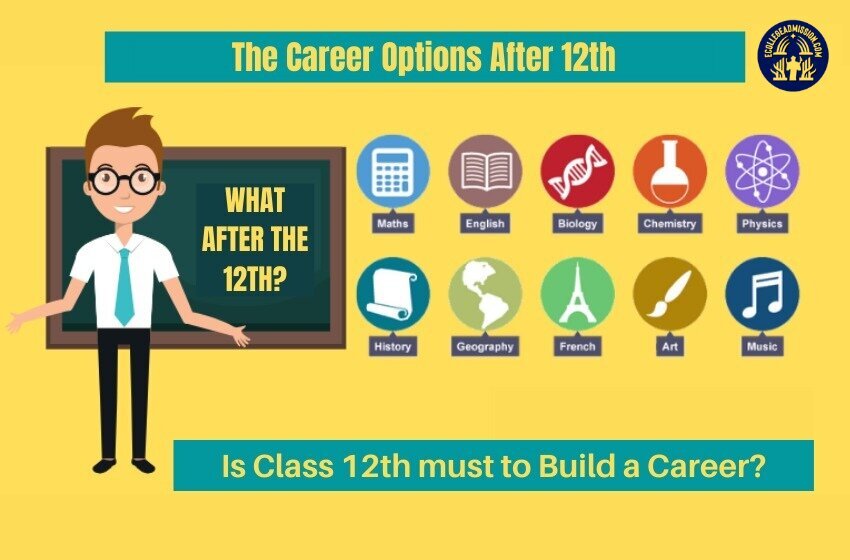Selecting a professional route following high school is a critical juncture where anticipation and doubt coexist. Making this decision involves careful assessment of your interests, abilities, and future objectives because there are many options. Here, we are talking about Top Career Paths After Schooling.

Compass Understanding
Before exploring particular possibilities, starting a journey of self-discovery is crucial. Consider these points to discover what you want to be:
What do you have a strong interest in?
What topics pique your interest, what hobbies make you happy, and what issues do you long to resolve?
What are your advantages and disadvantages?
Determine your learning preferences, areas for growth, and natural aptitudes.
What type of work atmosphere do you envision?
Are you more productive in fast-paced environments?
Do you enjoy working in collaborative teams or value solving problems independently?
What are your goals for your income and lifestyle?
Here, we are talking about Top Career Paths After Schooling:
Field of Science
| Medicine | ➢ An honorable and challenging career that requires commitment and intellectual distinction. ➢ Aim for the MBBS, focus on your area of interest, and contribute to the progress of healthcare. |
| Engineering | ➢ A broad discipline with several subfields, from computer science to civil engineering. ➢ Make a decision depending on your research opportunities, problem-solving skills, and interests. |
| Studies and Development | Explore your scientific interests by conducting research in a variety of disciplines, such as |
| Environmental science, biotechnology, or medicine. | |
| Environmental science | ➢ Use research, conservation, or policy formulation to address urgent environmental issues. ➢ Concentrate on sustainable development, renewable energy, or climate change topics |
| Data science and analytics | ➢ Examine large databases to find hidden trends and help guide choices. ➢ Get a degree in computer science, statistics, or data science and look into jobs in different sectors |
| Machine learning and artificial intelligence (AI) | ➢ Participate in the advancement and use of AI in various industries, including robots, finance, and healthcare. ➢ In AI or machine learning, consider specialized courses or master’s degrees. |
Commerce stream
| Business Administration | Equip yourself with management skills through a BBA and explore careers in finance, marketing, human resources, or international business. |
| Accounting & Finance | Develop your analytical abilities with a BCom and start a fulfilling investment banking, taxation, accounting, or finance. |
| Economics | Examine economic patterns and how they affect companies and communities. Earn a bachelor’s or master’s degree in economics to investigate consulting, policy analysis, and research opportunities. |
| Marketing and advertising | Develop persuasive messaging and approaches to connect with target consumers and advertise goods and services. Examine specializations in brand management, social media marketing, and digital marketing. |
| Human Resources | Manage employee relations, cultivate a happy work atmosphere, and attract top talent. Attend a master’s or bachelor’s degree program In human resources and earn certifications in areas such as talent acquisition and pay. |
| FinTech | Create cutting-edge financial solutions by fusing knowledge of finance and technology, such as mobile banking, blockchain applications, or algorithmic trading. Pursue specialized programs or join FinTech startups. |
Stream of Arts
| Law | Earn an LLB degree to promote justice and hone your intellectual and communication abilities. |
| Media & Communication | Develop your creative and communication skills in journalism, advertising, public relations, or filmmaking. |
| Design & Animation | Focus on areas such as corporate law, criminal law, or family law. Use multimedia, fashion, animation, or graphic design to communicate your creative idea. Build a solid network and portfolio within the sector. |
| Psychology | Gain an understanding of how people think and behave. Get a bachelor’s or master’s degree in psychology and find employment in research organizations, therapeutic settings, or educational establishments. |
| Social Work | Promote social justice and give people and communities more power. Concentrate on community development, family counseling, or child welfare. |
| Education | Develop young brains and motivate the following generation. Get a Bachelor of Education (B.Ed.) and focus on early childhood education or your chosen field of study. |
Outside of Conventional Routes
Recall that there are other occupations besides traditional ones. Think about:
Entrepreneurship: Launch your business using your passion and original idea. Acquire necessary experience and skills in business.
Creative Professions: Consider a career in performing arts, writing, photography, or music. Create your network, hone your skills, and identify your expertise.
Vocational Training: Acquire hands-on experience in trades, including electrical, plumbing, and carpentry. Take advantage of employment security and the possibility of significant earnings.
The Influence of Additional Education
Recall that your future is not entirely determined by your performance in your 12th grade. There are several options for additional education and skill development:
Undergraduate Degrees: Enroll in undergraduate courses that correspond with your areas of interest.
Vocational Courses: Through certificate or diploma programs, acquire practical skills in specialized trades. Many provide specialties and flexible study alternatives.
Online Learning: Consider enrolling in online degree programs or massive open online courses (MOOCs) for more flexibility and affordability.
Bootcamps & Workshops: Take part in intense courses to gain in-demand skills like digital marketing, data analytics, or coding.
Setting Your Path
Recall that picking a career is a lifelong process rather than a single choice. Here are some pointers:
Seek Guidance: Consult mentors, career counselors, or experts in areas of interest. Acquire knowledge and helpful guidance.
Build Connections & Network: Participate at industry gatherings, participate in online forums, and connect with professionals on LinkedIn.
Volunteering & Internships: Develop your skills, learn about new areas, and enhance your résumé.
Remain Up to Date: Keep up with developments in the field, new technological advancements, and employment prospects.
Be Flexible & Sturdy: The workplace is a dynamic place. Be ready to pick up new abilities, adjust to circumstances, and welcome lifelong learning.
The Strength of Knowledge and Experience
Though academic credentials hold value, abilities, and experiences are just as significant. Develop the following:
Technical Skills: Depending on your sector of choice, become proficient in pertinent software programs, programming languages, or data analysis tools.
Develop soft skills: Critical thinking, problem-solving, teamwork, and leadership. These are highly sought after in several industries.
Projects & Internships: Participate in voluntary work, personal projects, or internships to obtain practical experience. Emphasize these experiences in your portfolio and resume.
Certifications & Microcredentials: Obtaining industry-recognized certifications or micro-credentials in particular fields will improve your resume and show your knowledge.
FAQs
I’m not sure what my area of passion is. How can I locate my ideal job?
Self-awareness is essential. Consult consultants, take career evaluations, and investigate various options using volunteering, internships, and internet resources. Focus on pursuits that pique your interest and give you energy.
I have different interests than my parents, but they want me to follow a specific vocation. How should I proceed?
It is essential to communicate openly. Research your intended career, politely describe your interests, and show that you have what it takes to succeed. If necessary, get assistance from career counselors or other mentors.
My concern is job stability. Which professions provide stability?
Look at employment trends and expected growth in prospective industries. Consider industries with generally consistent demand, such as technology, healthcare, or education. Recall that flexibility and ongoing education are necessary for long-term job security.
Do high-priced degrees always translate into success?
A degree is helpful, but it’s not a guarantee of success. Investigate alternate routes such as online learning environments, apprenticeships, and vocational training. Prioritize developing a solid portfolio and learning pertinent skills.
How can I get over my fear of failing when picking a career?
Welcome to the adventure! Even failures present worthwhile educational opportunities. Begin modest, make attainable goals, and acknowledge your advancements. Be in the company of people who are encouraging your growth and exploration.
Is it acceptable for me to alter my job route in later life?
Definitely! Professional trajectories are seldom straight lines. By upskilling and adapting, you can go into new fields based on your changing experiences and interests. Maintaining relevance and prospering in today’s fast-paced employment environment requires lifelong learning.
How can I maintain my motivation and focus on my professional objectives?
Connect with people in your industry, make SMART goals (specific, measurable, achievable, relevant, and time-bound), and assemble an inspiring and motivating support network. Honor your successes, monitor your development, and ask for help.
What tools are available to support me while I pursue my career?
A lot of resources are available! Consult career counselors, use alumni networks, visit employment fairs, and investigate websites like Indeed and LinkedIn. Use government resources, job search websites, and educational institutions for guidance and support.
Conclusion
Selecting a career after high school is an important step, but remember, it’s not a final decision. You may now navigate this fascinating trip with the knowledge and tools this handbook provides. Accept self-discovery, consider several choices, and pursue.

